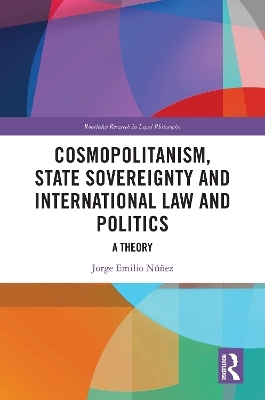
Cosmopolitanism, State Sovereignty and International Law and Politics
Routledge (Verlag)
978-1-032-33110-2 (ISBN)
- Lieferbar (Termin unbekannt)
- Versandkostenfrei innerhalb Deutschlands
- Auch auf Rechnung
- Verfügbarkeit in der Filiale vor Ort prüfen
- Artikel merken
This book assesses the relationship between cosmopolitanism and sovereignty. Often considered to be incompatible, it is argued here that the two concepts are in many ways interrelated and to some extent rely on one another. By introducing a novel theory, the work presents a detailed philosophical analysis to illustrate how these notions might theoretically and practically work together. This theoretical inquiry is balanced with detailed empirical discussion highlighting how the concepts are related in practice and to expose the weaknesses of stricter interpretations of sovereignty which present it as exclusionary. Finally, the book looks at territorial disputes to explore how sovereignty and cosmopolitanism can successfully operate together to deal with global issues.
The work will be of interest to academics and researchers in the areas of Legal Philosophy, Legal Theory and Jurisprudence, Public International Law, International Relations and Political Science.
Jorge E. Núñez is a Reader in Legal and Political Philosophy and International Relations at Manchester Law School, UK and Visiting Professor at Facultad de Ciencias Jurídicas y Sociales, UNLP, Argentina.
Preface xi
PART ONE
The situation in law and politics and the new vision 1
1 Sovereignty and cosmopolitanism: Pluralism of pluralisms and a multidimensional analysis 3
Introduction 3
General structure 7
Chapter 1 Introduction 8
Chapter 2 Sovereignty 9
Chapter 3 Cosmopolitanism 9
Chapter 4 Agents and players 10
Chapter 5 Contexts and realms 12
Chapter 6 Dimensions and variables 13
Chapter 7 Territorial disputes 15
Chapter 8 Conclusive remarks, limitations and implications 15
Aims, rationale and objectives 15
Methodology 17
The notions of sovereignty and cosmopolitanism in this monograph 18
The notions of pluralism of pluralisms and multidimensional analysis in this monograph 22
Choice of examples 25
Conclusion 25
Bibliography 27
2 Sovereignty 29
Introduction 29
Sovereignty 33
Normative and factual sovereignty 38
Factual sovereignty or de facto sovereignty 40
Normative sovereignty or de jure sovereignty 41
Limitations to factual and normative sovereignty 42
The axiological choice: value sovereignty 43
Conclusion 47
Bibliography 49
3 Cosmopolitanism 52
Introduction 52
Cosmopolitanism 54
Kinds of cosmopolitanism 57
Legal cosmopolitanism: natural and positive law 60
Positive law cosmopolitanism 63
Cosmopolitanism and universal law 65
Conclusion 70
Bibliography 71
PART TWO
The theory of multidimensionality and the pluralism of pluralisms 75
4 Agents and players 77
Introduction 77
Agents 79
Types of agents: individuals, communities and states 81
Self-ownership and sovereignty 83
Peoples: natives, implanted populations and divided societies 85
Players 91
Players and their characteristics 92
a) Rationality 92
b) Strategies 93
c) Information 95
Players, game theory and territorial disputes 95
Conclusion 99
Bibliography 100
5 Contexts, realms and modes of existence 104
Introduction 104
Contexts 106
Sovereignty, cosmopolitanism and the domestic context 108
Sovereignty, cosmopolitanism and the regional context 110
Sovereignty, cosmopolitanism and the international context 111
Realms 113
The factual realm, sovereignty and cosmopolitanism 115
The normative realm, sovereignty and cosmopolitanism 116
The axiological realm, sovereignty and cosmopolitanism 117
Modes of existence 119
Objects, methods and epistemological acts 120
Conclusion 125
Bibliography 126
6 Dimensions and variables 128
Introduction 128
Dimensions 131
Unidimensionality and multidimensionality 133
Linear dimensions 136
a) Vertical 137
b) Horizontal 138
c) Diagonal or transversal, curved or spiral and other linear relationships 139
Nonlinear dimensions 139
a) Self-referred 140
b) Regressive 141
c) Chaotic 141
d) Random 141
Time 142
Space 146
According to its scope 146
According to the way it is perceived 147
Conclusion 150
Bibliography 151
PART THREE
The application to territorial disputes and conclusive remarks 155
7 Territorial disputes 157
Introduction 157
The concept of “territorial disputes” 159
The case of Khemed between Borduria and Syldavia 163
Unidimensionality and Khemed 165
Multidimensionality and Khemed 170
In terms of population 174
In terms of territory 175
In terms of government 175
The significance to sovereignty and cosmopolitanism 177
Conclusion 179
Bibliography 180
8 Conclusive remarks, limitations and future implications 182
Introduction 182
Limitations and future implications 184
Deploying the multidimensional approach 187
Some final remarks: partial conclusions and guidelines 187
Conclusion 194
Bibliography 195
Index 197
| Erscheinungsdatum | 04.08.2023 |
|---|---|
| Reihe/Serie | Routledge Research in Legal Philosophy |
| Zusatzinfo | 6 Tables, black and white |
| Verlagsort | London |
| Sprache | englisch |
| Maße | 156 x 234 mm |
| Themenwelt | Geisteswissenschaften ► Philosophie |
| Recht / Steuern ► Allgemeines / Lexika | |
| Recht / Steuern ► EU / Internationales Recht | |
| Sozialwissenschaften ► Politik / Verwaltung ► Politische Systeme | |
| ISBN-10 | 1-032-33110-0 / 1032331100 |
| ISBN-13 | 978-1-032-33110-2 / 9781032331102 |
| Zustand | Neuware |
| Informationen gemäß Produktsicherheitsverordnung (GPSR) | |
| Haben Sie eine Frage zum Produkt? |
aus dem Bereich


